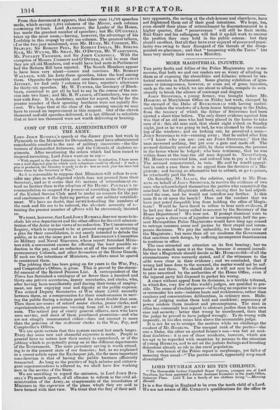COST OF THE CIVIL ADMINISTRATION OF THE ARMY.
LORD Jonat RUSSELL'S speech at the dinner given last week in Plymouth to the Members for Devonshire, must have administered considerable comfort to the race of military sinecurists—the Go- vernors of dismantled fortresses, and the Colonels of skeleton re- giments. After mentioning the orders which had been issued to suspend recruiting, Lord JOHN went on to say— "With regard to the other Estimates in reference to reduction, I have never seen a well-digested plan by which such reductions could be effected : if such a plan is produced, the Ministry is ready to do it : but no such plan has been laid before them by the Secretary at War."
As it is reasonable to suppose that Ministers will refuse to con- sider any plan as well-digested which does not proceed from their Secretary, and as it seems that his notions of retrenchment ex- tend no fluffier than to the adoption of Sir HENRY PARNELL'S re- commendation to suspend the process of recruiting, the fiery spirits of the United Service Club need be under no concern for the pay and emoluments of the fighting portion of our military establish- ment. We have no doubt, that notwithstanding the numbers of the rank and file are to be reduced, the absolute necessity of re- taining the present number of q,Ocers will be strenuously insisted
On.
We trust, however, that Lord Jon N RUSSELL does not mean to in- clude his own department and the other offices for the civil adminis- tration of the Army in his views of no reduction. The Commission of Inquiry, which is supposed to be at present engaged in maturing a plan for their consolidation, is not surely intended to delude the public, or to act the same part as Lord EBRINGTON'S Committee on Military and Naval Sinecures, whose report furnished Minis- ters with a convenient excise for effecting the least possible re- duction in the pay, and no reduction at all of the numbers of su- pernumerary Colonels, and other favourites at the Horse Guards. If such are the intentions of Ministers, no efforts must be spared to counteract them.
The jobbing that has been going on for years in the War, Pay, and Comptroller's Offices, is gross. This is proved by the shame- ful amount of the Retired Pension List. A correspondent of the Times has furnished a catalogue of no fewer than a hundred and thirty-one private secretaries, deputy secretaries, and clerks, who, after having been munificently paid during their terms of employ- ment, are now enjoying ease and dignity at the public expense. Two retired Deputy Secretaries at War share 3,500/. annually between them, as a compensation for their condescension in serv- ing the public during a certain period for about double that sum. Then there are scores of retired senior clerks, junior clerks, and superintendents, at pensions varying from 50l. to 1,000/. per an- num. The retired pay of ninety general officers, men who have seen service, and most of them purchased promotion—and who are not stingily remunerated either—does not amount to more than the pensions of the ci-devant clerks in the War, Pay, and Comptroller's Offices. We are quite certain that this system cannot last much longet. Every day some new and shameful exposure is made. People in general have no notion how their money is squandered, or of the jobbing which is perpetually going on in the different departments of the Government. The mere pecuniary saving is worth attend- ing to in the present state of our finances; but, as we explained in a recent article upon the Exchequer job, the far more important consderation is that of having the public business efficiently transacted. As long as the practice of high salaries and extrava- gant supemnnuations is adhered to, we shall have few working men in the service of the State.
We are unwilling to regard the omission, in Lord JOHN Rus- SELL'S Plymouth speech, of all allusion to reform in the civil ad- ministration of the Army, as symptomatic of the irresolution of Ministers in the execution of the plans which they are said to have formed with that view. We trust that the fury of their mili tary opponents, the raving at the club-houses and elsewhere, have not frightened them out of their good intentions. We hope, too, even should their plans of retrenchment be discountenanced in a higher quarter, that " perseverance " will still be their motto. Earl GREY and his colleagues will find it up-hill work to recover the position they once held in the public esteem : but they should recollect, that all they have ever enjoyed of power and popu- larity was owing to their disregard of the threats of the disap- pointed ex-placemen; and that "tampering with the Tories" has been very nearly their ruin as a Ministry.
















 Previous page
Previous page